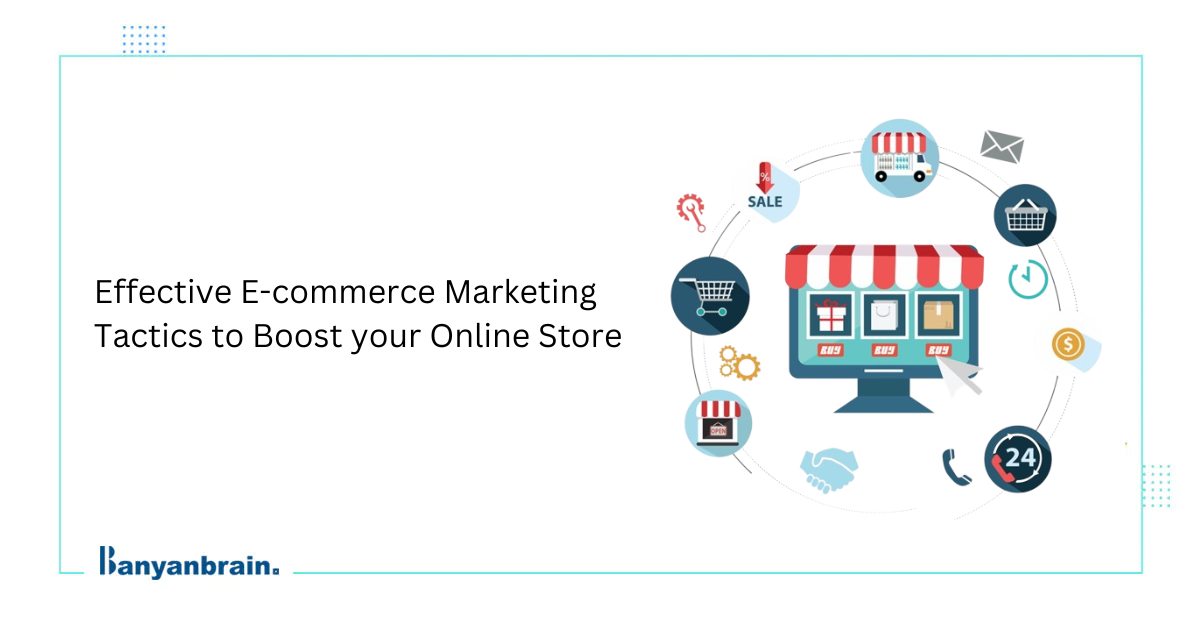E-commerce marketing strategies refer to strategies that focus on product promotion through specific tactics and digital strategies to drive traffic to your store and increase profit. E-commerce marketing boomed after 2020 as the demand for products and services increased after the lockdown. We can somehow summarise e-commerce marketing as follows:
Marketing plan + Engaging website = conversions (visitors into paying customers) + customer retained.
This formula emphasizes the crucial role of an engaging website in the conversion process. When an e-commerce marketing plan is combined with a user-friendly and captivating website, it converts site visitors into paying customers and aids in customer retention, increasing overall customer retention value (CLV).
Understanding E-commerce marketing
E-commerce marketing primarily uses promotional tactics to attract customers to your online stores and increase conversion rates. It is a multichannel strategy that helps you reach a wider audience and drive traffic to your stores. Efficient e-commerce marketing strategies help you to build brand loyalty and awareness and increase e-commerce sales.
E-commerce and digital marketing are intricately linked. An effective digital marketing strategy, website optimization, SEO, or PPC advertising is indispensable for an e-commerce business. Digital marketing is a subset of e-commerce marketing, playing a pivotal role in driving traffic to the site, reaching the target audience, enhancing the customer experience, fostering brand loyalty among customers, and ensuring global reach.
E-commerce marketing strategies you must follow
One can follow many strategies to increase business and drive traffic. Now, we will study some of the best e-commerce marketing strategies that you must follow:
Constructing a base: A fundamental base is essential for overall development. So, before implementing a marketing strategy, you need to understand your goal according to your requirements. Decide what the most crucial objective is to follow this year. Either it is to boost traffic to your site, increase your overall revenue, want customer retention, or any specific goal you want to fulfill. It is an essential e-commerce marketing tactic to first structure your goals and make strategies according to it.
Building a solid technical foundation: A strong foundation for an e-commerce marketing strategy is very important. Your site must be SEO-friendly and user-friendly. It should also be optimized for mobile phones, as the number of mobile phone users is increasing daily. Image optimization, compelling meta descriptions, and titles will form the base of the strategy.
E-commerce SEO: SEO, as we know, is search engine optimization. E-commerce SEO strategy works the same way: it improves visibility and drives traffic to your store. Keywords must be used according to the trends that people are targeting. URLs must consist of the primary keyword so they are easy to find. Additionally, it is essential to optimize your content structure and create a good user experience. On-page and off-page SEO, content creation, and site navigation are the most essential points to consider in e-commerce SEO. These steps can be clearer to you in the guide to e-commerce SEO.
Content marketing: Content marketing includes generating and establishing informational content to engage customers, improve sales, and decrease cart abandonment. It includes writing blogs, articles about your product, or generalizing information. You can also start a podcast related to your e-commerce business. There are many more sources through which you can spread awareness, like case studies, videos, downloaded templates, customer testimonials, and product guides. The most important thing is to be consistent with these e-commerce marketing strategies.
Social media marketing: Everyone knows about social media platforms like Facebook, Twitter, and Instagram. These platforms entertain and have become a hub of customers for e-commerce businesses. E-commerce businesses can create and share content on social media to promote an e-commerce store. This increases customer engagement and brand followers. Influencer collaboration is advantageous for e-commerce businesses. Analyzing the metrics of social media platforms would be a cherry on top for promoting businesses. SMO services like Facebook and Google ads can be provided by Digital marketing companies.
E-mail marketing: E-mail marketing is one of the oldest, tried, and tested e-commerce e-commerce marketing strategies. This tool can be very beneficial if the marketing team uses it efficiently to deliver welcome, thank you, and informational emails about sales and product launches according to customers’ needs. This ensures a personal touch with the customer. One can start or create a weekly newsletter for the subscribers through emails. E-mail marketing for e-commerce can retain customers and compel them to return to their carts.
Pay-per-click advertising: Pay-per-click advertising for e-commerce is used by advertisers who pay each time users click on their ads on social media or any digital platform. The product page appears at the top of SERPs due to an efficient PPC strategy. PPC comprises an offer, ad, and landing page. The two best platforms for this are Facebook and Google, which bring more traffic than any other platform. When the customers search for the keywords, the ad with the highest bid gets displayed. One can consult an online marketing agency to ensure the best advertising.
Virtual quizzes, webinars, and surveys: Quizzes and surveys can be organized, allowing customers to review your site on every topic. Webinars will ensure your products’ goodwill by organizing virtual events about a product launch or any informational meetings or webinars. Online quizzes will help engage customers on your site. They act as an e-commerce marketing guide for advertisers.
Customer loyalty campaigns: These campaigns help to retain customers over time. Customers who have made purchases are precious, and customers who are given benefits for repeat purchases will be attracted to your product. These programs strengthen the relationship between the customer and the business by remembering the personalized entails and offering discounts accordingly. This can be the last step of the e-commerce marketing plan.
Influencer marketing: This marketing campaign for e-commerce businesses is increasing daily. In it, companies want to reach a specific audience through someone they trust immensely and who has followers on social media. This is a subset of social marketing in which the brands provide products to the influencers and advertise their brand on social media. Influencer marketing can also be termed affiliate e-commerce marketing strategy.
Retargeting: Retargeting ads, as the name suggests, is the marketing strategy in which ads are shown to customers who have already visited your site. These customers are interested in buying your product; you just need to target them through Facebook or Google ads. The users who have ever searched for keywords related to your site are potential customers who can be converted into paying customers by retargeting. E-commerce marketing companies can ensure this efficiently.
With the help of the right E-commerce marketing strategies, you can promote your personal brand, increase product sales, and ensure brand awareness digitally. Digital marketing and e-commerce marketing complement each other. Through e-commerce marketing strategies, one can increase the traffic to their online stores and ensure the loyalty of their products. One must follow many strategies to ensure efficient online marketing, such as PPC or pay-per-click advertising, which refers to payment according to user clicks on the link.
Influencer marketing uses influencers with a report in front of the targeted section of customers to promote their products as an SMM campaign. Content marketing includes blogs, articles, and podcasts related to your product, spreading awareness. Customer loyalty campaigns ensure the retention of valuable customers. Social media platforms like LinkedIn, Instagram, Facebook, and YouTube can also be used to promote business. Therefore, these basic strategies can enhance your business if used efficiently.
FAQs:
What is the marketing strategy of e-commerce?
The marketing strategy for e-commerce includes content marketing, improving your e-mail campaigns, influencer marketing campaigns, using responsive design, and investing in SEO, optimizing your pages.
What are the 5 C’s of e-commerce marketing?
The 5C’s are company, collaborators, customers, competitors, and context. These 5 C’s help a business to understand its position in the market.
What are the three important strategies for e-commerce?
Effective digital marketing, data-driven decisions, and optimizing user experience would be important e-commerce strategies for e-commerce.
What are the major types of e-commerce businesses?
The major types of e-commerce businesses are business-to-business (B2B), Business to consumer(B2C), Consumer to consumer(C2C), Customer to business(C2B), Business to Government (B2G), and Government to business (G2B).
What is the B2B model of e-commerce?
The B2B model of e-commerce involves transactions of one business with other businesses. One business sells its goods and services to other businesses. For example: Alibaba is a global B2B business selling its products to other businesses.
What is B2C in e-commerce?
B2C in e-commerce refers to business with consumers through online platforms. This is the most common type of e-commerce and includes direct transactions between customers and businesses.






